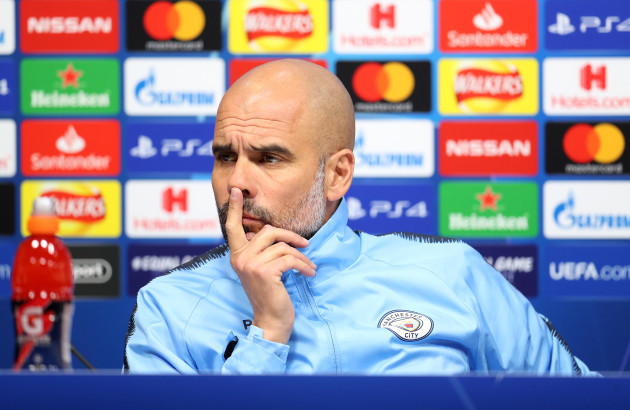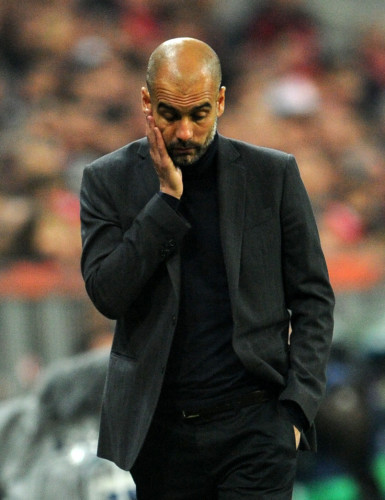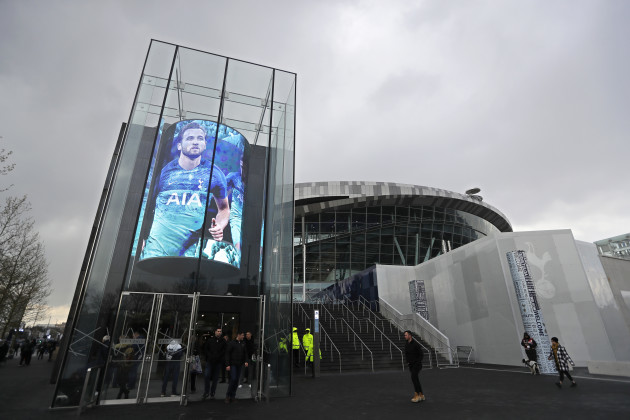“I NEVER THOUGHT that we would not lose a game, you can’t imagine that” reflected Pep Guardiola in October 2016, after his 100% record in English football was shattered by a 2-0 defeat to a ferocious Tottenham at White Hart Lane.
Two-and-a-half years on, City are exuding the kind of invincible air in which you’d question whether they will actually lose another game.
If they remain unbeaten, chances are they’ll complete an unprecedented quadruple…but could that seeming invincibility prove their undoing?
As City prepare to face Tottenham in the first leg of their Champions League quarter-final tonight, Guardiola’s curious record in the competition is foregrounded.
Although he is undoubtedly the dominant manager of his generation – both for what he has won and what he has inspired in others – Guardiola hasn’t been in a European final since beating Manchester United at Wembley in 2011.
Okay, cup competitions and their essential luck and anarchy are not good baselines for populating the pantheon – Roberto Di Matteo, for example, can’t be said to have been a better coach than Pep since 2012 – but the trend raises a legitimate question.
At Bayern, he thrice fell at the semi-final stage; at City he has yet to make it beyond the last eight.
It is notable that his Champions League exits have been destructions as often as they have been defeats.
In the second leg of first semi-final with Bayern Munich, his side were battered 4-0 at home by Real Madrid having already lost the earlier tie 1-0.
The following year Bayern were beaten 3-0 in the first leg of their semi-final by Barcelona, while they were narrowly edged out by Atletico Madrid at the same stage the following year.
At City he has had two relative failures: the loss to Monaco in the last 16 during his first season, while last season a much better City team were blown away by Liverpool, losing the first leg 3-0 at Anfield.
What connects the trio of heavy defeats to Madrid, Barcelona and Liverpool is not that his sides played particularly terribly, but instead they conceded a glut of goals in a relatively short space of time.
Against Madrid it was two goals in four minutes and a third 14 minutes later; with Barca it was two in three minutes with the third arriving another 14 minutes later; while against Liverpool, City conceded twice in nine minutes and again ten minutes later.
The theories behind this curious – and often fatal – flaw have been expounded elsewhere, best by journalist and author Jonathan Wilson who argues that these brief but lasting aberrations are the result of a side not used to responding to such intense pressure, having had their edge dulled by their own dominance.
It is a seductive idea, that the biggest strength of Guardiola’s approach – a dominance of games and domestic leagues hitherto unseen – is also its biggest weakness when the biggest games come along.
Champions Leagues are often won by teams hewn from adversity – Real Madrid have had the individual talent and leadership to survive a series of pressure moments over the last five years, while wins for Chelsea and Inter over the past decade speak to this trend, too – and it sometimes feels like Guardiola’s teams not only have a glass chin, but are unaware that they have one.
City are on a ludicrous run of form: since the turn of the year they have won 20 of 21 games, and as obviously impressive as that is, the relative strength of their opponents should be taken into account.
Since beating Liverpool at the start of 2019, the only of their elite English rivals they have played are Arsenal and Chelsea, whom they hammered 6-0 and saw off on penalties in the Carabao Cup final.
Their progress to one cup win, another cup final and this quarter-final has been serene, but helped by a favourable draw.
This isn’t to pick holes in City’s achievements – they have been largely brilliant since the calendar changed – but Rotherham, Burton Albion, Newport County, Schalke, Chelsea, Swansea and Brighton is a benign run of cup opponents.
Aside from the loss to Newcastle in January, City have trailed just twice all year – to Swansea and in the first leg of the Schalke tie.
The past European implosions have been preceded by similarly excellent runs of form: prior to the Madrid tie Bayern had won 16 of 21 games; 14 wins from 21 precipitated the Barcelona defeat; while they arrived at Anfield last year off the back of 14 wins in 18 games.
So if City are to be caught cold, Spurs may be well placed to take advantage tonight.
They will feed off the unique energy given to them by playing in their new stadium, and have the kind of ferocious pressing game that unsettled City at Anfield last season.
Whether they will or not remains to be seen.
If City can emerge from the next two-and-a-half weeks unscathed – featuring as it does a third game with Spurs in the league, along with clashes with Man United and Crystal Palace – then they will have gone a long way to answering this critique of Guardiola’s teams.
Adversity lies ahead.
On TV: Virgin Media One, BT Sport 2; KO 8pm



